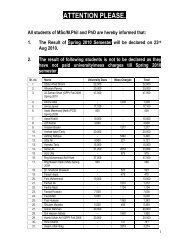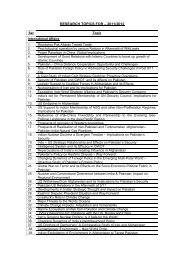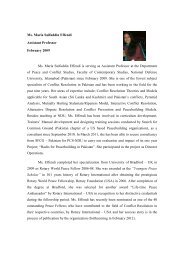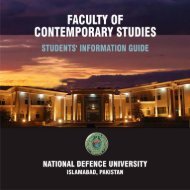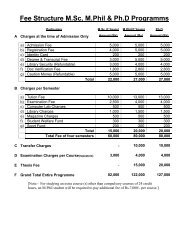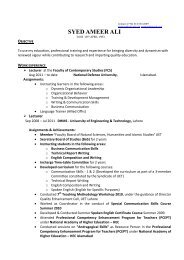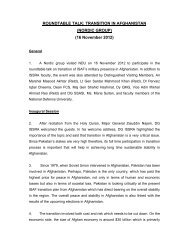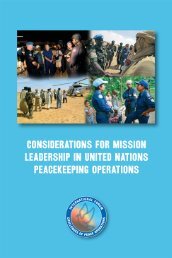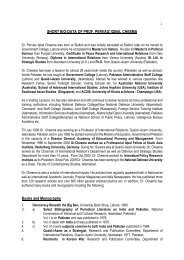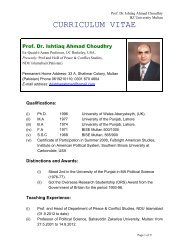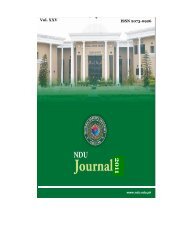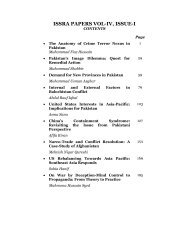OPINION Vol.1, No.1 June 2013 - National Defence University
OPINION Vol.1, No.1 June 2013 - National Defence University
OPINION Vol.1, No.1 June 2013 - National Defence University
Create successful ePaper yourself
Turn your PDF publications into a flip-book with our unique Google optimized e-Paper software.
Job generation, education, health, services like roads, electricity, water supply, etc, have<br />
conspicuously lagged behind.<br />
Social change has not kept pace with technological advancement.<br />
India has a conflict-prone society. Communalism, caste difference, rich and poor divide are<br />
major source of social strife and violence.<br />
Given the raw deal to minorities, backward sections of the society and the rural poor, a sense<br />
of deprivation has set in a process of alienation reflected in insurgencies.<br />
Nonetheless, world is so completely enamoured of India’s “growth story” that it seems willing<br />
to ignore the simple fact that India is home to the largest population of the poor, hungry and<br />
malnourished in any country on the planet.<br />
Revisiting the Fundamental Criterion. After browsing different dimensions of Indian power potentials,<br />
here is a re-visit to the six criterion questions discussed at the start of the paper.<br />
In material context, “is there an increase in Indian capabilities in either relative or absolute sense” –<br />
Answer is Yes, however, not enough.<br />
In historical context, “is India more powerful than the past” – Answer is Not exactly, as India has<br />
not yet proven her credentials outside India.<br />
In diplomatic context, “is India more engaged in the world than previously”Answer is partially<br />
Yes, however, India continues to discriminate her immediate neighbours.<br />
In competing context, “how do other states view India having a larger role in the world than in the<br />
past” Not exactly as mere US strategic partnership will not fetch India, the status of becoming<br />
a lead rule maker in the world.<br />
In domestic context, “does the state increasingly affect the lives of ordinary people”Answer is No.<br />
In terms of measures of power, “what are the net capabilities in terms of power projection, control<br />
over territory, alliance construction, share of world material capabilities, and the collective will to<br />
assume the role of a great power)” India’s growing power does not seem reason enough to count<br />
her among the ‘great powers,’ as long as its vast majority of people are forced to live a life of<br />
misery, deprivation and social discrimination.<br />
Implications of India attaining a Great Power Status for Pakistan<br />
Growing Indian international / regional influence will reduce leverage for Pakistan especially in the<br />
realm of both conflict management and resolution.<br />
In an idealist scenario, Indian quest to gain great power status may motivate her to pacify Pakistan’s<br />
concern on bilateral issues, however, in a realistic scenario India is not likely to leave any space<br />
which can be exploited by Pakistan.<br />
In case India is unable to mend fences with China, then clash of interests of two giants will seriously<br />
affect Pakistan’s stability situation.<br />
Growing political clout inside Afghanistan especially Post 2014, will be detrimental to Pakistan’s<br />
interests in the region.<br />
Increased Indian military capability will accentuate both conventional and strategic asymmetry; it<br />
may also affect our strategic capability of ‘Credible Minimum Nuclear Deterrence’.<br />
Indian presence in Indian Ocean close to our EEZ / territorial water will present a continuous threat<br />
to our SLOCs as well as the coastal belt.<br />
Enlarging threat paradigm would put added pressure on national exchequer to maintain the large<br />
standing armed forces.<br />
Indian new found status will be equally damaging to Pakistan defence acquisition especially from<br />
the Western bloc.<br />
India is likely to exploit Pakistan’s internal vulnerabilities and will induce internal instability to<br />
force continued commitment of armed forces in sub-conventional warfare.<br />
<strong>OPINION</strong> <strong>Vol.1</strong> <strong>No.1</strong> 40 <strong>June</strong> <strong>2013</strong>



